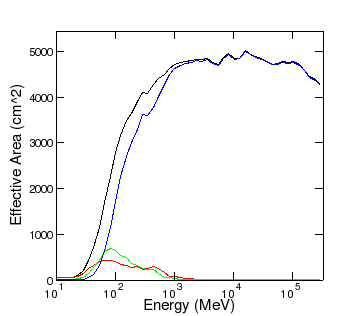...
- We will use the EVENT_CLASS column to designate the single event class to which are particular event belongs. In the case of Pass 5, the CTBCLASSLEVEL values minus 1 (in order to have them start at zero) can be used. Separate front vs back conversion type information will not be encoded in the EVENT_CLASS value, but it will instead just reside in the CONVERSION_TYPE column, thereby factoring out the redundant information that had been contained in previous implementations. This scheme will have several consequences:
- Separate IRFs for each class will need to be generated, but instead of generating the IRFs using events that have a minimum CTBClassLevel, as we currently do, the IRFs will need to be generated for significantly smaller numbers of events for which CTBClassLevel is a specific value, e.g., CTBClassLevel==1, CTBClassLevel==2, CTBClassLevel==3. In this case, only the IRFs for CTBClassLevel==3 would be the same as an original Pass 5 set (diffuse class). There would be substantially fewer events for CTBClassLevel==0 or 1. Here is a plot of the effective area for the front section for the three CTBClassLevel values using the AllGamma_v13r9p3_Lyon data:
The smaller number of events overall and the significant dearth of any events above 1 GeV will cause difficulties for characterizing the PSF and energy dispersion for the EVENT_CLASS 0 and 1 values.EVENT_CLASS
CTBClassLevel cut
curve
number of events
0
==1
red
0.27 M
1
==2
green
0.24 M
2
==3
blue
4.30 M
0,1,2
> 0
black
4.81 M
- Since each event has a unique set of IRFs, gtdiffrsp will only have to be run once regardless of the downstream selections on EVENT_CLASS.
- The gtselect interface will need to be modified. I propose two new sets of parameters to handle selections on the EVENT_CLASS and CONVERSION_TYPE columns separately:
Either one of these will produce a set of events that are the same as would be produced using "CTBCLASSLEVEL > 1 && CONVERSION_TYPE==0" in fcopy or fselect. It is anticipated that users will only want to specify a range of EVENT_CLASS values and not wish to make non-contiguous selections such as "EVENT_CLASS==0 && EVENT_CLASS==2". It is likely that users will not want to make selections excluding the higher event classes, so evclsmin may be all that is needed. These will be hidden parameters and the defaults will be to make no selections on EVENT_CLASS or CONVERSION_TYPE.Code Block gtselect evclsmin=1 evclsmax=2 convtype=0 gtselect evclsmin=1 convtype=0
- Depending on the number of event classes included, gtexpmap will run correspondingly slower. Since the Psf integral over the ROI is by far the most cpu-intensive part of the gtexpmap calculation and since it has to be performed separately for each set of IRFs, event selections that include three event classes (the proposed default for Pass 5) will take three times as long as the current implementation. (There may be a way of mitigating this by having the different PSFs share the cached values of the ROI integrals.)
- Separate IRFs for each class will need to be generated, but instead of generating the IRFs using events that have a minimum CTBClassLevel, as we currently do, the IRFs will need to be generated for significantly smaller numbers of events for which CTBClassLevel is a specific value, e.g., CTBClassLevel==1, CTBClassLevel==2, CTBClassLevel==3. In this case, only the IRFs for CTBClassLevel==3 would be the same as an original Pass 5 set (diffuse class). There would be substantially fewer events for CTBClassLevel==0 or 1. Here is a plot of the effective area for the front section for the three CTBClassLevel values using the AllGamma_v13r9p3_Lyon data:
